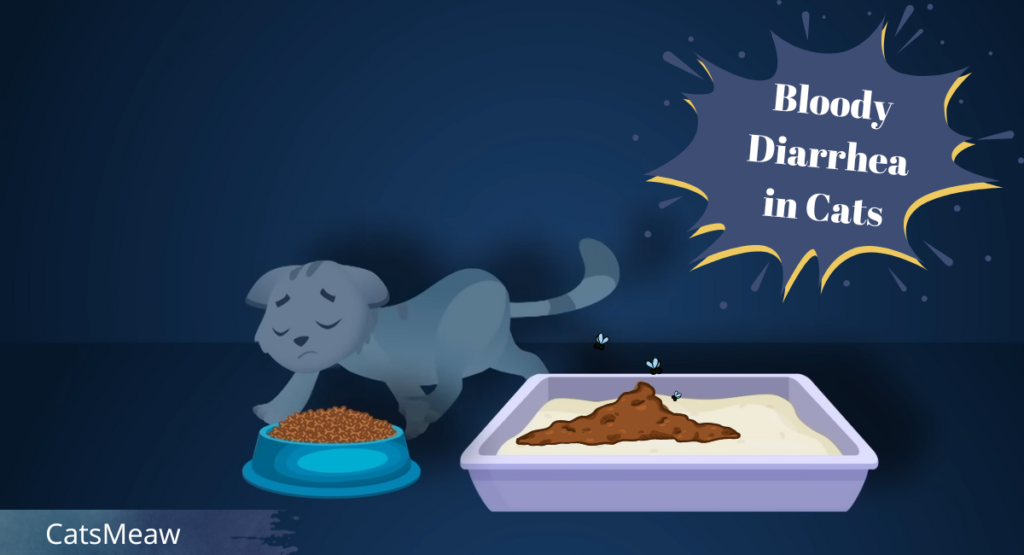It’s important to be aware of any changes in your cat’s health. One concerning issue that may arise is blood in cat diarrhea. Bloody diarrhea in cats can be a sign of an underlying health problem, and it’s crucial to understand the causes, symptoms, and treatment options. In this article, we will provide you with comprehensive information about blood in cat diarrhea, so you can take appropriate action when needed.
Table of Contents
Causes of Bloody Diarrhea in Cats
There are several potential causes of bloody diarrhea in cats. One common cause is gastrointestinal parasites, such as roundworms or hookworms. These parasites can irritate the intestines, leading to bloody stools. Another possible cause is bacterial or viral infections, such as feline panleukopenia or salmonellosis. These infections can cause inflammation and damage to the digestive tract, resulting in blood in cat diarrhea.
Dietary issues can also contribute to blood in cat diarrhea. Abrupt changes in diet, the consumption of spoiled food, or food allergies can all lead to gastrointestinal upset and bloody stools. Additionally, certain medications, such as nonsteroidal anti-inflammatory drugs (NSAIDs), can have adverse effects on the digestive system, causing bloody diarrhea.
Symptoms of Blood in Cats Diarrhea
Detecting bloody diarrhea in your cat can be distressing, but recognizing the accompanying symptoms can help you determine the severity and potential cause. Alongside the presence of blood in the stool, you may notice frequent, urgent bowel movements, straining to defecate, and a general change in your cat’s behavior. Other symptoms can include vomiting, lethargy, loss of appetite, and weight loss. If your cat displays any of these symptoms, it is crucial to seek veterinary help promptly.
When to Seek Veterinary Help for Diarrhea in Cats
Bloody diarrhea in cats can vary in severity, and determining when to seek veterinary help can be challenging. However, it is generally recommended to contact your veterinarian if the blood in cat diarrhea persists for more than 24 hours, if your cat appears to be in pain, or if they are experiencing other concerning symptoms like dehydration or weakness. Your veterinarian will be able to assess your cat’s condition and provide the necessary guidance and treatment.
Our pick: The Best Cat Supplements & Vitamins
It’s important to note that if your cat has ingested a toxic substance or if the bloody diarrhea is accompanied by extreme lethargy or vomiting, immediate veterinary care is essential. Time is of the essence in emergencies, and delaying treatment can be detrimental to your cat’s health.
Diagnosing Blood in Cats Diarrhea
When you bring your cat to the veterinarian for blood in cats diarrhea, they will perform a thorough examination and may recommend additional tests to determine the underlying cause. These tests can include fecal analysis to check for parasites, blood work to assess organ function and detect any signs of infection, and imaging studies such as X-rays or ultrasounds to evaluate the gastrointestinal tract. By identifying the root cause of the blood in cats diarrhea, your veterinarian can create an appropriate treatment plan.
Related: Cat Not Eating: Causes & Treatments
Treatment Options for Diarrhea in Cats
The treatment for bloody diarrhea in cats depends on the underlying cause. In cases of gastrointestinal parasites, your veterinarian will prescribe deworming medication to eliminate the parasites. If a bacterial or viral infection is the culprit, antibiotics or antiviral medications may be necessary.
Dietary changes, such as a bland diet or a hypoallergenic diet, can help alleviate symptoms caused by dietary issues. It is essential to follow your veterinarian’s guidance on medication administration and dietary recommendations to ensure your cat’s recovery.
In severe cases where dehydration or other complications have occurred, your cat may require hospitalization and intravenous fluids for proper hydration and supportive care. Your veterinarian will monitor your cat’s progress throughout the treatment process and make adjustments as needed.
Home Remedies for Bloody Diarrhea in Cats
While it is crucial to consult a veterinarian for guidance. for blood in cat diarrhea, there are some home remedies that can provide temporary relief. However, these remedies should never replace professional veterinary care. You can try feeding your cat small, frequent meals of easily digestible food, such as boiled chicken and rice.
It is also essential to ensure your cat has access to fresh water to prevent dehydration. Probiotic supplements may help restore the balance of beneficial bacteria in the gut, aiding in the recovery process. Nevertheless, always consult your veterinarian before administering any home remedies to ensure they are appropriate for your cat’s specific situation.
Preventing Bloody Diarrhea in Cats
Preventing bloody diarrhea in cats involves maintaining their overall health and minimizing potential risks. Regular veterinary check-ups, including fecal examinations, can help detect and treat parasites early on. Providing a balanced and high-quality diet tailored to your cat’s needs can reduce the chances of dietary issues. Also, ensure your cat has access to clean water at all times and avoid sudden changes in their diet. Keep toxic substances out of your cat’s reach and be cautious with medications, only administering them under veterinary guidance.
Taking Care of Your Cat’s Health
blood in cat diarrhea can be alarming, but armed with the knowledge of its causes, symptoms, and treatment options, you can ensure your feline companion receives timely and appropriate care. Remember to consult your veterinarian if you suspect your cat has bloody diarrhea or any other health concerns. By staying vigilant and proactive in your cat’s healthcare, you can help maintain their well-being and provide them with a happy and healthy life.
